Effective Support for Families in Merton
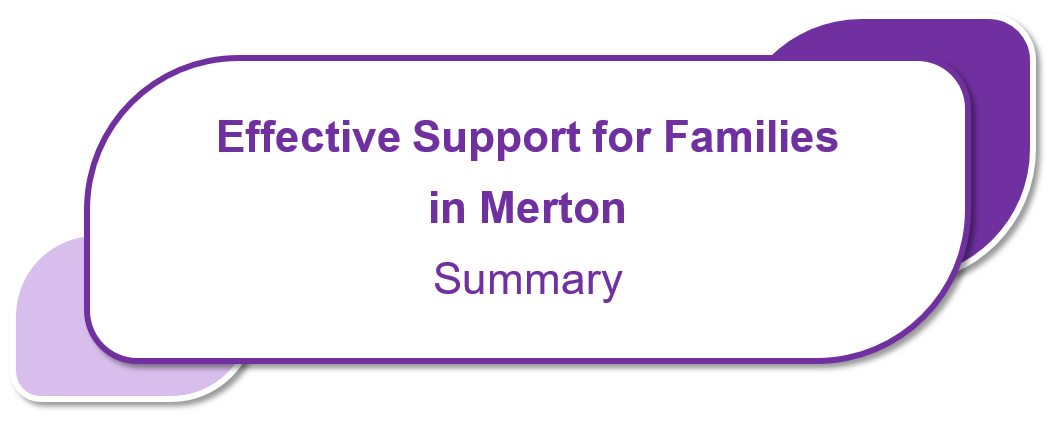
This guidance aims to support practitioners through the process of working alongside families to consider needs and identify the most appropriate support, empowering families to make positive and sustainable change and reducing the risk of needs escalating
This is a summary of the full document Effective Support for Families in Merton, which should be read and understood by all those working with children and families in the borough.

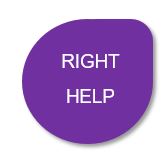
To work alongside all family members, helping them to think about their worries and come up with their own ideas and plans to make things better, building on their own family and community resources and strengths.
To develop and train the children’s workforce so that everyone uses the same language, tools and approaches so that everyone knows what to expect.

To have clear information along with agreed systems and processes so that problems are picked up early and support is put in place to help things get better.
To work together to provide support to children, young people and their families at the lowest level possible in accordance with their needs.
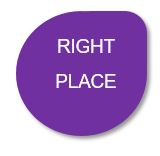
To support connections in the community, building relationships with local people so that everyone knows how and where to get advice and support when they need it and that people can access services and support in their local area
In Merton we want to make sure that all children can achieve well in the following areas of life:

Where children, young people and families may require support to achieve this, we will work together to consider individual needs and offer guidance and support through delivery of our Effective Support approach.
This approach provides those working with families with a shared approach to practice that is based on what we know makes a difference.
In order to do this, we have adopted an approach with the underlying principles being;
SYSTEMIC having an understanding that individuals are part of a wider context and considering this when working to identify goals and how to achieve them
RELATIONSHIP BASED to build open, honest and strong relationships, and to be able to develop a level of trust which will help them to be empowered to create real and sustainable change
Children and Young people can be at different levels of needs for education, health and care and can move between these levels as their needs change. The child’s journey through all levels of need is one that all agency partners wish to ensure is as smooth and time limited as possible, supporting our ‘right help, at the right time and in the right place’ approach.
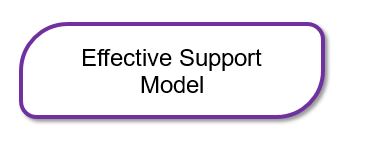
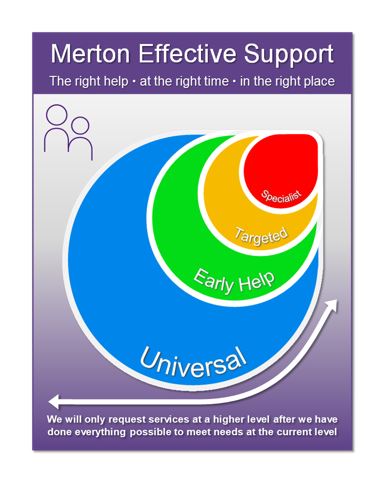
The Effective Support model is a tool used to support the assessment of needs of children, young people and families.
Each section of the model represents the level of need for a child, young person or family.
The Indicators of Need Guidance further details the type of behaviour and circumstances that indicate a need at a particular level, these should be used to aid practitioner assessment.
It is important to note that these indicators provide a guide only and are not definitive.
Individual needs must always be considered within a broader context
Thrive framework and i-Thrive delivery
The Thrive model is a national framework that thinks about the mental health and wellbeing needs of children, young people and families through five different needs based groupings as shown in this image.
It places importance on the prevention and promotion of mental health and wellbeing across the whole population.
The framework supports children, young people and families to make decisions and informed choices about the support and care they can receive and the groupings help to organise the different options that are available depending on what people feel at that point in time.
We have aligned this framework to our Effective Support Model:
- Thriving / Getting Advice
- Getting Help
- Getting More Help
- Getting Risk Support
Most children and young people in Merton have needs at this level and are thriving.
All families should be encouraged to access all services they are entitled to, including education, health and social and play opportunities.
All families and those working alongside them are able to access information on the range of services and provision available in the borough by accessing our local service directories at www.merton.gov.uk/FSD
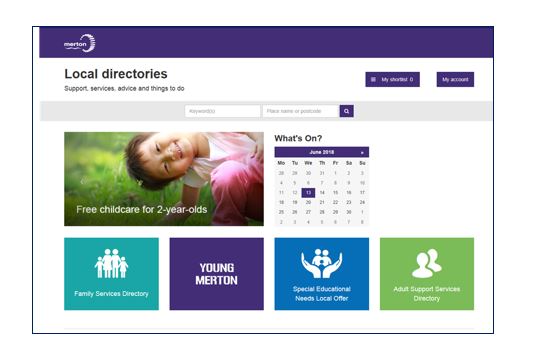


When families need a little extra help to access support over and above the universal services available to them, it’s really important to start with a discussion. When a need is identified, the first response should be to talk to relevant family members to gather their views and to support them to think about what they could do to make things better.
EARLY HELP ASSESSMENT
The Early Help Assessment Template can be used to aid discussion and allow you and the family to think about what support might be needed and to plan for next steps.
TEAM AROUND THE FAMILY
In some instances, it may be helpful to convene a Team Around the Family to bring together professionals working with the family. Team Around the Family Template. Again the Family Service Directories can be used to help to identify appropriate services and provision to meet specific needs
FAMILY INFORMATION & SUPPORT HUBS
Some families may just need a little extra support to identify the appropriate services and support available to them. Family Information and Support Hubs provide an access point for parents/carers to
gain information, advice and guidance on a range of subjects helping them to think about what support they need and empowering them to access the information or help that they need.
think about what support they need and empowering them to access the information or help that they need.
Sessions are 45 minutes long and offered both face to face and virtually, bookable via Eventbrite (either by parents/carers or by a practitioner on their behalf.
Family Information & Support Hub | Eventbrite
Family Information and Support Hubs (FISH) Leaflet
EARLY HELP SUPPORT COODINATORS
If you are working with a family and are unsure of the best way to support, or would like guidance to think about what may be available you might wish to speak to an Early Help Support Coordinator.
Early Help Support Coordinators offer support and guidance to professionals across the children’s workforce, helping them to safely and effectively assess family’s needs and ensure families are able to access the right support at the right time. With an array of knowledge of services and support available across Merton. They are on hand to offer advice and guidance to professionals who are working with families who require support
The Early Help Support Coordinators can offer support to;
- assess child and family needs utilising Effective Support Model
- guide the undertaking of an early help assessment
- convene a ‘Team Around the Family’(this will include the offer of attending first meeting)
- develop family plans/identify appropriate interventions
- identify relevant support services / provide information on criteria and referral routes
To contact please email fsd@merton.gov.uk

When a family’s needs are more complex, practitioners should first consider the information outlined in Level 1 and 2 as these steps may be adequate to meet family needs, however it is possible that a more coordinated and targeted response to the identified need will be required.
EARLY HELP ASSESSMENT
In order to further understand the needs and the impact that these are having on the child, young person and family, we recommend that an Early Help Assessment (Appendix 2) is completed with the family. The Early Help Assessment aids discussion with families and allows for a more detailed review of the families’ strengths and challenges, thinking about what needs to happen to make things better. The form contains prompts throughout to ensure that family members are able to contribute fully, sharing their views and wishes. The assessment encourages contribution from all professionals working with the family and the plan allows for actions to be agreed and reviewed.
TEAM AROUND THE FAMILY
A Team Around the Family (TAF) network should be convened in order to gather and share information across the range of professionals working with the family. The TAF Network should work alongside the family to develop and implement a family plan with clearly defined goals. These should be reviewed regularly and progress against them recorded.
CAMHS
Where a child or young person is experiencing mental health difficulties or there are concerns regarding their emotional wellbeing, in the first instance consultation should take place via the Child and Adolescent Mental Health Service (CAMHS) consultation line. The consultation line can be reached via the CAMHS Single Point of Access on 0800 2922505. Via this consultation line, the needs of the child or young person will be considered and advice given as to whether CAMHS involvement alone will be sufficient, or whether support may also be required from Children’s Social Care
FAMILY WELLBEING SERVICE
The Family Wellbeing Case Practitioners work to a whole family approach. Referrals to this one to one family support can be made where there are multiple / complex needs at level 3, that require a coordinated multi agency response to whole family needs and where there is evidence that needs cannot be met within existing accessible resource.
To make a referral please see information on this page.
CONSULTATION
If you are unsure about what support is available to families presenting with needs at Level 3 or above, you can contact the Children and Families’ Hub and speak to a duty Social Worker, who can advise you of possible next steps. This can be done by calling 0208 545 4226/4227

Children’s Social Care has a responsibility to Children in Need in Merton under section 17 of the Children Act 1989. That is, children whose development would be significantly impaired if services are not provided. This includes children who have an enduring and profound disability, which limits their ability to carry out the tasks of daily living.
Enquiries can also be conducted under Section 47 of the Children Act. That is, where there are concerns that a child or young person is suffering or is likely to suffer significant harm. Enquiries under Section 47 can be made without consent as the concept of significant harm justifies compulsory intervention in family life in the best interests of children and young people.
Children’s Social Care REQUEST FOR SERVICE
- The Multi Agency Safeguarding is where information can be sought and shared with partner agencies, in particular our colleagues in Education, Health, Police to aid the assessment of need and support decision making regarding the safeguarding of children and young people.
- Children’s Social Care Children’s Social Care has a responsibility to Children in Need in Merton under section 17 of the Children Act 1989. That is, children whose development would be significantly impaired if services are not provided. This includes children who have an enduring and profound disability, which limits their ability to carry out the tasks of daily living.
Referrals of this nature should be made by completing a form via this page or emailing it to candfhub@merton.gov.uk, you can also call on 0208 545 4226/4227 to discuss possible referrals or to notify social care of an urgent situation.
Consent should always be sought wherever possible, unless doing so would place a child, young person or vulnerable adult at risk of harm. However, professionals should never delay sending a Safeguarding Referral if they believe that a child or young person is suffering or likely to suffer significant harm due to not being able to obtain consent.
When submitting a request, please ensure to add as much relevant information as possible, focusing on
- what has been seen/ heard to cause concern
- what is the impact on the child / young person
- what are the family’s views
- what support has been offered and what was the impact of this
- what needs to happen to alleviate concerns
MSCP Training
We regularly run training on this subject matter – please see below available courses coming up.
- Effective Support for Families In Merton - 26-09-2024
- Effective Support for Families In Merton - 19-11-2024
- Effective Support for Families In Merton - 20-03-2025
Documents
- Creating a Family Plan Guidance
- Early Help Assessment Guidance
- Early Help Assessment Template 2024
- Effective Support for Children in Merton
- Effective Support Practitioner Summary
- EHA and TAF Parents Guide
- Role of Lead Practitioner Guidance
- Team Around the Family Guidance
- Team Around the Family (TAF) Template 2024
- Merton Effective Support Model Overview poster - February 2024
- MSCP Indicators of Possible Need Poster 2024

